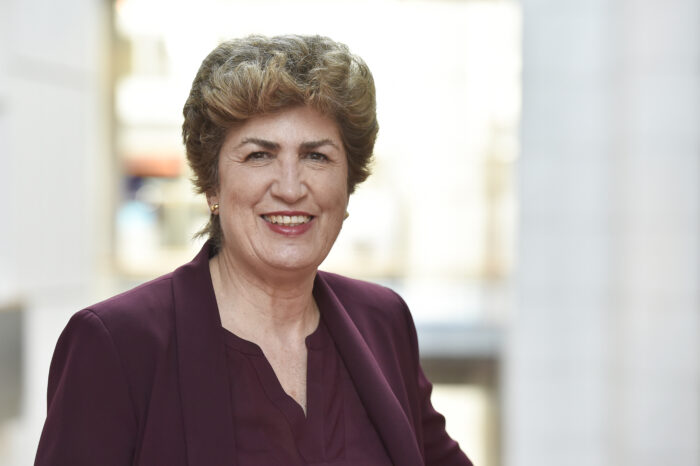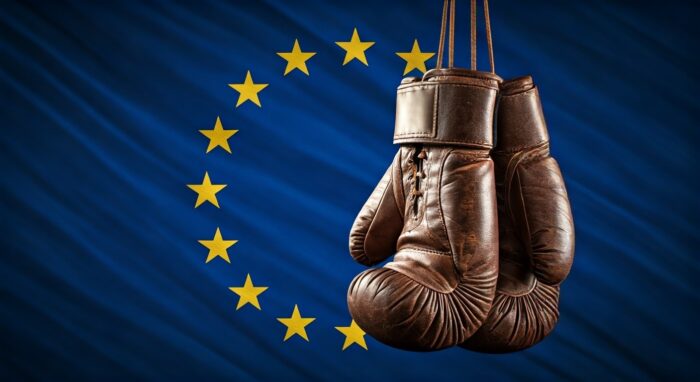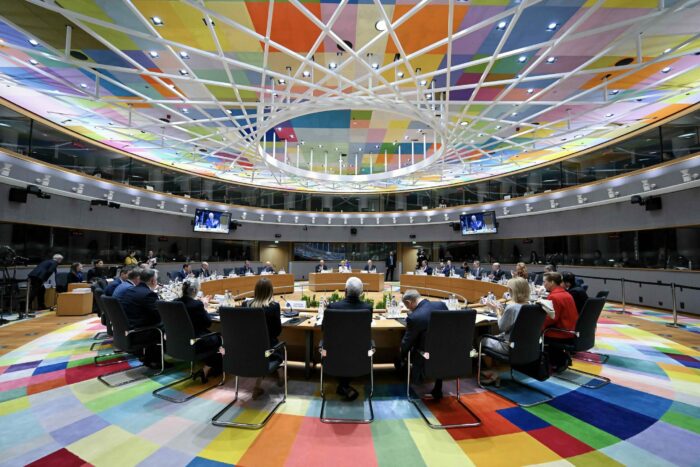Find all related Progressive Post
Progressive Post

The terms and the time horizon of a peace solution in Ukraine remain highly uncertain and will shape our possible futures for the times ahead. But this should not delay a stronger response to the challenges of the 21st century we are confronted with. The outlook for 2023 clearly shows that we are entering a new historical era.
The brutal invasion of Ukraine by Putin’s Russia brought back the marks of the 20th century, with violent clashes between different political regimes and a self-perceived empire trying to expand its vital area by military force, ignoring the global order’s basic rules. The resolve of the European Union to support Ukraine must be kept until a solution for peace is found with strong guarantees for the Ukrainian side. The terms and the time horizon of such a solution remain highly uncertain, but they will shape our possible futures for the times ahead.
The commitment to support the Ukrainian war effort should not delay a stronger response to the challenges of the 21st century we are confronted with. They are a new type of challenge because they have a global scale from the start, and they can only be tackled with much stronger international cooperation. We began with a global financial crisis in 2008-2012, then a pandemic in 2020-2022 and an enduring climate crisis – all of them deepening social inequalities within countries, between countries and between generations.
Despite many uncertainties and risks, the outlook for 2023 clearly shows that we are entering a new historical era which will deeply change the relationship between each of us and:
– the planet and nature, limits will need to be respected according to principles of sustainability which are under generalised discussion;
– the rest of humankind with a global Agora emerging and new poles asserting themselves, particularly China, India and the Global South;
– the reality of our life which is increasingly radically transformed by its expanding digital and virtual dimension.
The Covid-19 pandemic brought a unique large-scale collective experience because it was generally perceived as a global, immediate and existential threat, requiring exceptional measures on all fronts: health, social, industrial, economic, financial and political.
These exceptional measures started defining an alternative to the neoliberal paradigm which was dominant in policymaking for a significant part of the 20th century. More recently, the so-called Washington consensus is being questioned on many fronts – including within the Bretton Woods institutions themselves – but a full-fledged alternative is still to be built and to become dominant.
Right now, we are at a historical bifurcation regarding fundamental political alternatives:
– on the one hand, a counter-reaction driven by populist leaders claiming that nationalistic retrenchment conducted by an authoritarian state is the best approach to meet people’s concerns with jobs, living costs, health and security,
– on the other hand, a progressive approach based on higher cooperation, solidarity and stronger intervention by a democratic state as well as by an updated multilateral system. This alternative still needs to make a fullaggiornamento to get rid of influences of the previously dominant paradigm and to cope with new radical transformations, notably the digital one.
At the international level, the defeat of President Donald Trump by Joe Biden and, more recently, of Jair Bolsonaro by Luiz Inácio Lula da Silva raise new hopes for the second alternative to take the upper hand. Nevertheless, there are other authoritarian poles in the world. And the risk of a new Cold War is increasing, particularly if China becomes more aligned with Russia. Furthermore, this kind of battle is also taking place inside the European Union, particularly when conservative forces make governing alliances with more extreme right ones. A big dispute will take place in the upcoming European elections but, in the meantime and because urgent actions are needed, many choices can already be made by the current constellation of European actors, including the EU presidencies of the Council.
This is high time for the European Union to make bolder choices:
The Swedish Presidency of the EU Council just announced its priorities, showing a worryingly low level of ambition. It will be up to the Spanish and Belgian presidencies to shift the direction and raise the ambition to a higher level.
Photo credits: Shutterstock/tomertu
| Cookie | Duration | Description |
|---|---|---|
| cookielawinfo-checkbox-advertisement | 1 year | Set by the GDPR Cookie Consent plugin, this cookie is used to record the user consent for the cookies in the "Advertisement" category . |
| cookielawinfo-checkbox-analytics | 11 months | This cookie is set by GDPR Cookie Consent plugin. The cookie is used to store the user consent for the cookies in the category "Analytics". |
| cookielawinfo-checkbox-functional | 11 months | The cookie is set by GDPR cookie consent to record the user consent for the cookies in the category "Functional". |
| cookielawinfo-checkbox-necessary | 11 months | This cookie is set by GDPR Cookie Consent plugin. The cookies is used to store the user consent for the cookies in the category "Necessary". |
| cookielawinfo-checkbox-others | 11 months | This cookie is set by GDPR Cookie Consent plugin. The cookie is used to store the user consent for the cookies in the category "Other. |
| cookielawinfo-checkbox-performance | 11 months | This cookie is set by GDPR Cookie Consent plugin. The cookie is used to store the user consent for the cookies in the category "Performance". |
| csrftoken | past | This cookie is associated with Django web development platform for python. Used to help protect the website against Cross-Site Request Forgery attacks |
| JSESSIONID | session | The JSESSIONID cookie is used by New Relic to store a session identifier so that New Relic can monitor session counts for an application. |
| viewed_cookie_policy | 11 months | The cookie is set by the GDPR Cookie Consent plugin and is used to store whether or not user has consented to the use of cookies. It does not store any personal data. |
| Cookie | Duration | Description |
|---|---|---|
| __cf_bm | 30 minutes | This cookie, set by Cloudflare, is used to support Cloudflare Bot Management. |
| S | 1 hour | Used by Yahoo to provide ads, content or analytics. |
| sp_landing | 1 day | The sp_landing is set by Spotify to implement audio content from Spotify on the website and also registers information on user interaction related to the audio content. |
| sp_t | 1 year | The sp_t cookie is set by Spotify to implement audio content from Spotify on the website and also registers information on user interaction related to the audio content. |
| Cookie | Duration | Description |
|---|---|---|
| CONSENT | 2 years | YouTube sets this cookie via embedded youtube-videos and registers anonymous statistical data. |
| iutk | session | This cookie is used by Issuu analytic system to gather information regarding visitor activity on Issuu products. |
| s_vi | 2 years | An Adobe Analytics cookie that uses a unique visitor ID time/date stamp to identify a unique vistor to the website. |
| Cookie | Duration | Description |
|---|---|---|
| NID | 6 months | NID cookie, set by Google, is used for advertising purposes; to limit the number of times the user sees an ad, to mute unwanted ads, and to measure the effectiveness of ads. |
| VISITOR_INFO1_LIVE | 5 months 27 days | A cookie set by YouTube to measure bandwidth that determines whether the user gets the new or old player interface. |
| YSC | session | YSC cookie is set by Youtube and is used to track the views of embedded videos on Youtube pages. |
| yt-remote-connected-devices | never | YouTube sets this cookie to store the video preferences of the user using embedded YouTube video. |
| yt-remote-device-id | never | YouTube sets this cookie to store the video preferences of the user using embedded YouTube video. |
| yt.innertube::nextId | never | This cookie, set by YouTube, registers a unique ID to store data on what videos from YouTube the user has seen. |
| yt.innertube::requests | never | This cookie, set by YouTube, registers a unique ID to store data on what videos from YouTube the user has seen. |
| Cookie | Duration | Description |
|---|---|---|
| COMPASS | 1 hour | No description |
| ed3e2e5e5460c5b72cba896c22a5ff98 | session | No description available. |
| loglevel | never | No description available. |


